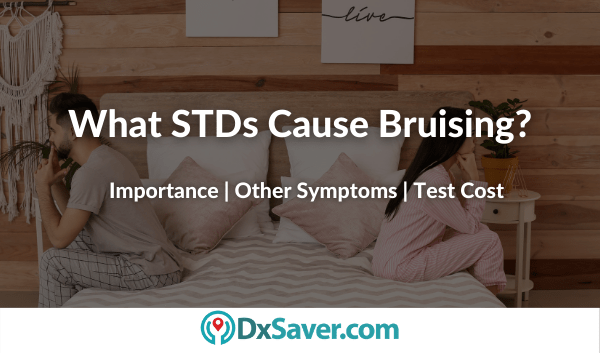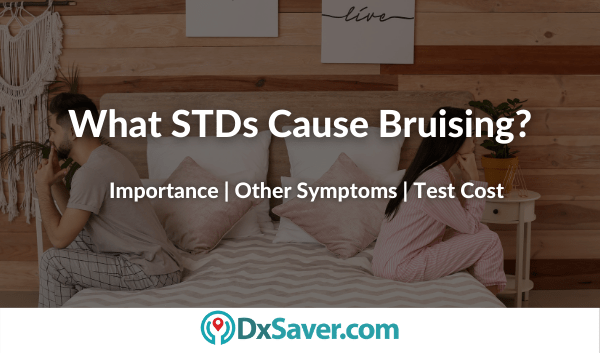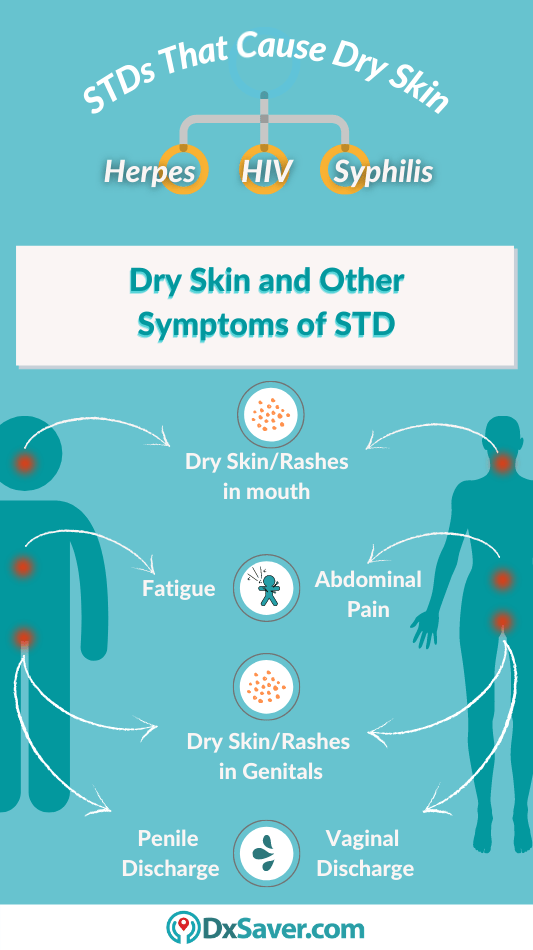Let’s talk about something important – sexually transmitted diseases, often known as STDs. These are conditions that can spread when people have sexual contact, like vaginal, anal, or oral sex, especially if it’s unprotected. You might have also heard them referred to as venereal diseases or VDs. STDs can be identified with various symptoms. In this article we will deep dive into STDs that cause bruising.
HIV is the most common STD that may cause bruising. Other than that Herpes and Syphilis may cause dry skin or rashes but not exactly bruising. Chlamydia may cause itching.
In this article, we explain in detail the types of STDs that cause bruising, other symptoms of STDs, and how to get tested. The table of contents is given below:
- What is bruising?
- Do STDs cause bruising?
- What are the STDs that cause bruising and itching?
- Can HIV cause bruising?
- Can Syphilis cause bruising?
- Can Chlamydia cause bruising?
- What are the other causes of brusing?
- How are STDs trested?
- How do I get checked for STDs?
- How much does STD testing cost?
Get Tested for STDs
If you would like to be tested for STDs that most commonly cause bruising and similar symptoms like rash, we can help you choose the right provider. One of the best options for STD testing is STDcheck. The key reasons why you should choose STDcheck are given below.
- 100% Confidential STD Testing
- 5 Minute Testing with Results in 1 to 2 days
- All Tests are FDA-Approved / Cleared
- Same-Day STD Testing Available
- Over 4,500 Testing Centers Nationwide
Just click on the photo or the link given below and you can book your desired STD tests online. You can also choose a center that is nearest to your location. We recommend that you choose a 10-panel test as getting tested individually for the above three STDs that cause rashes will be more expensive than the 10-panel test package.
What is bruising?
Bruises are black and blue marks which is a common skin injury. Bruises result in discoloration of the skin which is due to the blood from the damaged blood cells beneath the skin collecting near the surface of the skin. Bruising can occur at any age, as it is a consequence of trauma – a cut or a blow to an area of the body.
Sometimes bruising on your skin aches and most people see it as harmless or painless. While bruises on the skin may not seem to be a major issue, but, it’s important to know the underlying cause and get appropriate treatment options to avoid any serious health complications in the future.

Symptoms of a Bruise
- Initially, a fresh bruise is reddish in color. After a few hours, it will turn blue or dark purple, then yellow or green after a few days as it heals.
- A bruise might be painful in the initial few hours or a few days, typically the pain fades away as time progresses with the fading of the bruising.
Do STDs cause bruising?
STDs are infections that spread via sexual contact or genital touching. There are more than 20 types of STDs caused by various microorganisms such as parasites, bacteria, & viruses. Generally, not all STDs cause bruising on your skin. Only HIV/AIDS infection shows bruising as a sign, in fact, the bruising may occur for no reason. However, Herpes and Syphilis are STDs that can cause dry skin, itching all over the body, and other rashes/redness.
Following are the most commonly seen symptoms of STDs in men and women.
Symptoms in women
- Unusual vaginal discharge
- Painful urination
- Pain during sexual intercourse
- Lower abdominal pain
- Heavy menstrual bleeding
Symptoms in men
- Thick penile discharge
- Burning sensation while urinating
- Swollen testicles
- Anal itching
- Irritation inside the penis
- Painful bowel movements
Common symptoms
- Fever
- Headache
- Weight loss
- Diarrhea
- Joint pain
- Jaundice
- Sore throat
Can HIV cause bruising?
Is HIV one of the STDs that cause bruising? It is important to know what is HIV/AIDS before diving into the reason why this STD specifically causes bruising symptoms. HIV is also a common sexually transmitted disease, where 38 million people are living with HIV/AIDS worldwide, and 690,000 people have deceased due to HIV/AIDS in 2019, according to a study from the World Health Organisation (WHO).
The HIV virus progresses in three stages. Initially in the first or second stage bruising on your skin is not seen. Other symptoms like cough, fever, headache, and muscle pain are experienced. It is vital to get checked for HIV as a proactive measure to improve your immune system to fight the virus. If untreated or undiagnosed, your immune system loses the battle against the virus, and HIV starts engulfing the CD4 T cells also commonly known as White Blood Cells, and starts manipulating in mass. Even during the second stage, some people do not experience any symptoms, and doctors call this the asymptomatic period or chronic HIV infection.
Without any diagnosis or treatment, the virus keeps manipulating in silence leading to AIDS (Acquired Immuno Deficiency Syndrome) which is the third and deadliest stage. The number of CD4 cells has dropped and thus you are open to getting infected by other infections easily.
If you didn’t know earlier that you were infected with HIV, you may experience some of these symptoms:
- Being tired all the time
- Swollen lymph nodes in your neck or groin
- Fever that lasts more than 10 days
- Night sweats
- Weight loss with no obvious reason
- Purplish spots on your skin that don’t go away
- Shortness of breath
- Severe, long-lasting diarrhea
- Yeast infections in your mouth, throat, or vagina
- Bruises or bleeding for no reason
As the disease progresses, bruising becomes more common for no reason as your immune system cannot fight the foreign substances invading. Read more on HIV RNA early detection tests here.
Does Syphilis cause bruising?
Is Syphilis one of the STDs that cause bruising? Syphilis is an STD that is caused by Treponema pallidum bacteria. Similar to HIV, Syphilis STDs also progress in 4 stages namely primary, secondary, latent, and tertiary stages. The most commonly seen symptoms of syphilis in both men and women are rashes like a painless sore that appears on the genitals and groin areas in both sexes. Typically, they cause rashes/sores but not bruising.
Does Chlamydia cause bruising?
Is Chlamydia one of the STDs that cause bruising? Chlamydia is the most commonly reported STD in the US. According to the CDC, nearly 3 million people are diagnosed with Chlamydia in the United States every year. Chlamydia STD is characterized by penile/vaginal discharge, pain or bleeding while urinating, urge to urinate, itching, bleeding or mucus discharge in the rectum, redness or itching in the eye, sore throat, cough, or fever. Therefore, there are no reported cases of having bruises on the skin due to chlamydia STD. Chlamydia can cause itching but not bruising.
Other causes of bruising
It is not always STDs when it comes to bruising on your skin. If you’re not an avid sex player, then the following are some of the other chances of having a bruise or discoloration of your skin.
- Intense exercise
- Medication
- Nutrient deficiency
- Diabetes
- Von Willebrand disease – a genetic disorder that affects your blood’s ability to clot.
- Thrombophilia – your blood has an increased tendency to clot. This condition occurs when your body makes too much or too little clotting chemicals.
- Chemotherapy
- Cushing’s syndrome
However, if you have multiple sex partners and sexually active, then the above causes are to be unlikely. You may have contracted STDs through unprotected sex. Get tested as early as possible, because when it comes to STDs and HIV, the sooner the diagnosis and treatment, the better you can recover.
How are STDs treated?
Bacterial STDs can be treated with antibiotics if treatment begins at an early stage. Unfortunately, viral STDs like HIV cannot be cured, but you can control symptoms with daily medications. If you are given antibiotics to treat STDs, you should take all of the drugs prescribed by your physician, even though you stop showing symptoms. Also, avoid taking someone else’s medication to cure your infection; this will lead to severe difficulties in diagnosing.
If you suspect your partner having STD-related bruising and other symptoms, but thinking or hoping your partner doesn’t have is no protection — you need to know for sure by having your partner tested for STDs. This way you can protect yourself and start diagnosis for your partner at an early stage avoiding major health complications.
How much is the cost of the STD test?
There are different forms of tests to get diagnosed with STDs. Firstly, your physician may ask you to take a sample using a cotton swab in the infected area such as mouth, throat, vagina, anus, or penis, or you may be asked to give a blood sample or a urine sample. The test shall be taken based on the medical and sexual history you have and the symptoms you experience.
There are many providers of STD testing in the market each with its own merits. Our partner company, STDcheck distinguishes itself due to its vast network, 5 minutes testing process, and certified testing. The STD testing starts at just $24 but taking a panel of tests is usually more economical where you can get tested for as many as 10 STDs for under $150
Where can I get tested?
STD tests can be done across the US in any of the states. STDCheck has over 4500 labs each so you will never be too far away from an STD testing lab.
Frequently asked questions about STDCheck testing
Will insurance cover my STD testing cost?
In order to ensure your privacy, STDcheck does not accept insurance. However, you can be provided with an itemized receipt for insurance reimbursement purposes.
How should I book my appointment for STD testing?
Using the above-given links, you can go to the STDcheck website, choose your tests, and your location, and book the tests or panels online. The whole process is easy and straightforward.
Can I cancel my lab test order?
You may cancel your order at any time before you visit the lab. A 20% cancellation fee will be charged for refunds. All cancellation requests made 21 days after purchase will be given credit for future testing.
Do the providers offer result interpretations?
If your results are positive, STDcheck can provide a doctor consultation and a written prescription for $95. STDcheck offers a written prescription for your partner at an additional fee of $95.
How do I receive my report?
You can view the results through the online portal.










